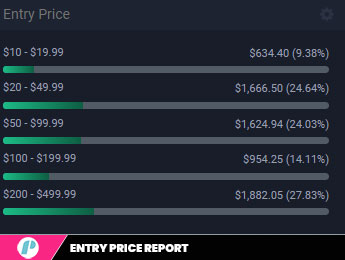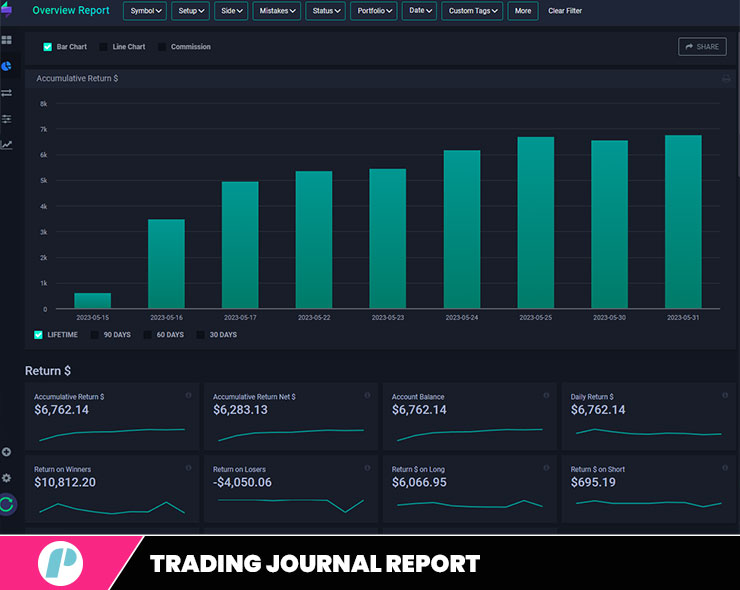
Introduction
In a fast-paced and dynamic environment such as the world of financial trading, success, and failure are often determined by a combination of knowledge and skills as well as a diligent analysis of one’s own trading habits. It is in fact for the latter that a trading journal can be an important tool that can greatly contribute to a trader’s success.
In this article, we’ll discover what a trading journal is as well as explore the importance of maintaining one and how it can dramatically improve a trader’s decision-making process, improve performance, and help build a long-term profitable trading career.
Why keep a trading journal at all?
Richard Kent – professor emeritus at Maines’ College of Education and Human Development – once wrote:
“A journal provides an athlete with a place to set goals, reflect, grapple with issues, keep track of training ideas, and record results as well as plan, scheme, ponder, rant, question, draw, and rejoice”.
Whilst the Professor was clearly referring to sports, the same can be said about any performance-based profession or activity, and that, of course, includes trading.
Many successful financial traders keep journals to document their trading activities, strategies, and personal reflections.
Some of the traders known for their journaling practices include names you might have heard before.

Jesse Livermore, a speculator from the early 20th century, believed in the importance of keeping detailed records of his trades. He documented all his wins, losses, and market observations in his journal.
Ed Seykota, a pioneer of computer-based trading systems, suggested all traders should keep a trading diary to “track emotions, market conditions, and important lessons learned”.
Paul Tudor Jones, a billionaire hedge fund manager, is known -amongst other things – for his disciplined approach to trading. He uses daily journaling to record market analysis, trading circumstances, and all his personal insights.
Remember, keeping a trading journal is a personal habit that can benefit traders of any level, not just the famous ones.
What is a trading journal and how does it help?
A trading journal is a detailed record of trades, the reasoning behind each of them, strategies, emotions, and lessons learned.
Trading Journals come in many forms; from the simplest spreadsheet to the most complex software on the market, traders will find (or create) the format that they are most comfortable using and the one that works best with their own method of trading.
Here are some of the many reasons traders (experts, professionals, and beginners alike) choose to keep a trading journal:
-
Records and Evaluation:
Keeping a trading journal allows traders to maintain a full and complete record of all the trades they have opened and closed. By recording entries, exits, position sizes, and other relevant details, traders can then review and analyze their trading decisions objectively at a later time (and, possibly, with a cooler head). This can help to recognize and identify patterns, the trader’s strengths, weaknesses, and areas for improvement.

Analyzing past trades is very important and extremely useful in improving or resting new strategies by taking data-based decisions rather than intuition or “gut feeling”.
-
Self-Reflection and Emotional Discipline:
Trading can evoke a range of emotions such as fear, greed, frustration, and impulsiveness. A trading journal allows individuals to reflect on their emotional state before, during, and after each trade. By recording emotions and thoughts, traders can objectively assess their psychological biases and tendencies, identify patterns of behavior, and make necessary adjustments. This self-reflection process enables traders to develop emotional discipline, helping them make more rational and controlled decisions even in stressful market conditions.
-
Learning and Improvement:
The trading journal serves as a valuable learning tool. It provides traders with a platform to document lessons learned from both the winning and the losing trades. By constantly reviewing past trades, traders can identify what worked and what didn’t, allowing them to refine and tune their strategies and avoid repeating mistakes over and over.
The journal acts as a guide for traders to continually learn from their experiences, successes, failures, and great ideas as well as their mistakes so that they can refine their trading plans, and evolve their skills over time.
-
Risk and Money Management:
As everyone knows (hopefully), effective risk and money management are crucial factors for successful trading. A trading journal allows traders to review and analyze their risk management strategies, including position sizing, take-profit stop-loss levels, and overall risk/reward ratios.
By tracking their money management strategy through their own records, traders can identify any deviations or mistakes made in managing risk and apply the necessary adjustments to ensure optimal risk management practices thereafter.
-
Accountability and Consistency:
A trading journal can also hold traders accountable for their decisions and actions, motivating and incentivizing consistency in their trading approach.
Consistency is the key to developing a good trading discipline, refining strategies, and creating a solid trading plan.
A trading journal often reinforces the trader’s commitment to their goals, helps them monitor progress, and highlights areas of weakness that require improvement.Being accountable (even if just to oneself) can drastically improve decision-making and creates fertile ground for a proactive commitment to achieving long-term success in the trading markets.
Is it better to make our own trading journal or use any of the software available ready-made?
Any trading journal, whether it is made using the good old pen and paper, a simple Excel document, or trading journal software, is bound to improve your trading results by at least some measure but… which is better?
Gone are the days when traders had to rely on a self-made spreadsheet able to hold only a handful of details and information about each trade. Sure, a self-made trading journal is still very useful but – to put it frankly – nowadays, we can get a much better and more all-rounder journal than any we could make ourselves AND… without the effort, of course!
Many Companies now produce and offer ready-made trading journals that traders can start using right away. They come in different forms and with many different features and are structured in a way that makes it easy to review and examine past trades and performances.
According to stocktrader.com, the best of such software currently are:
TraderSync: “Best overall trading journal”.*
Tradervue: “Great for professionals, steep learning curve”.
Trademetria: “Simple design”.
Remember:
The Trading Journal is one of the most undervalued and underutilized tools at a trader’s disposal but it’s also amongst the most useful. It offers an immediate way to analyze trading habits, past mistakes, successes, patterns, and motivations and to learn from it all.
* Also, remember that you can get your very own TraderSync trader Journal when you Join Trade The Pool!
If you liked this post make sure to share it!







